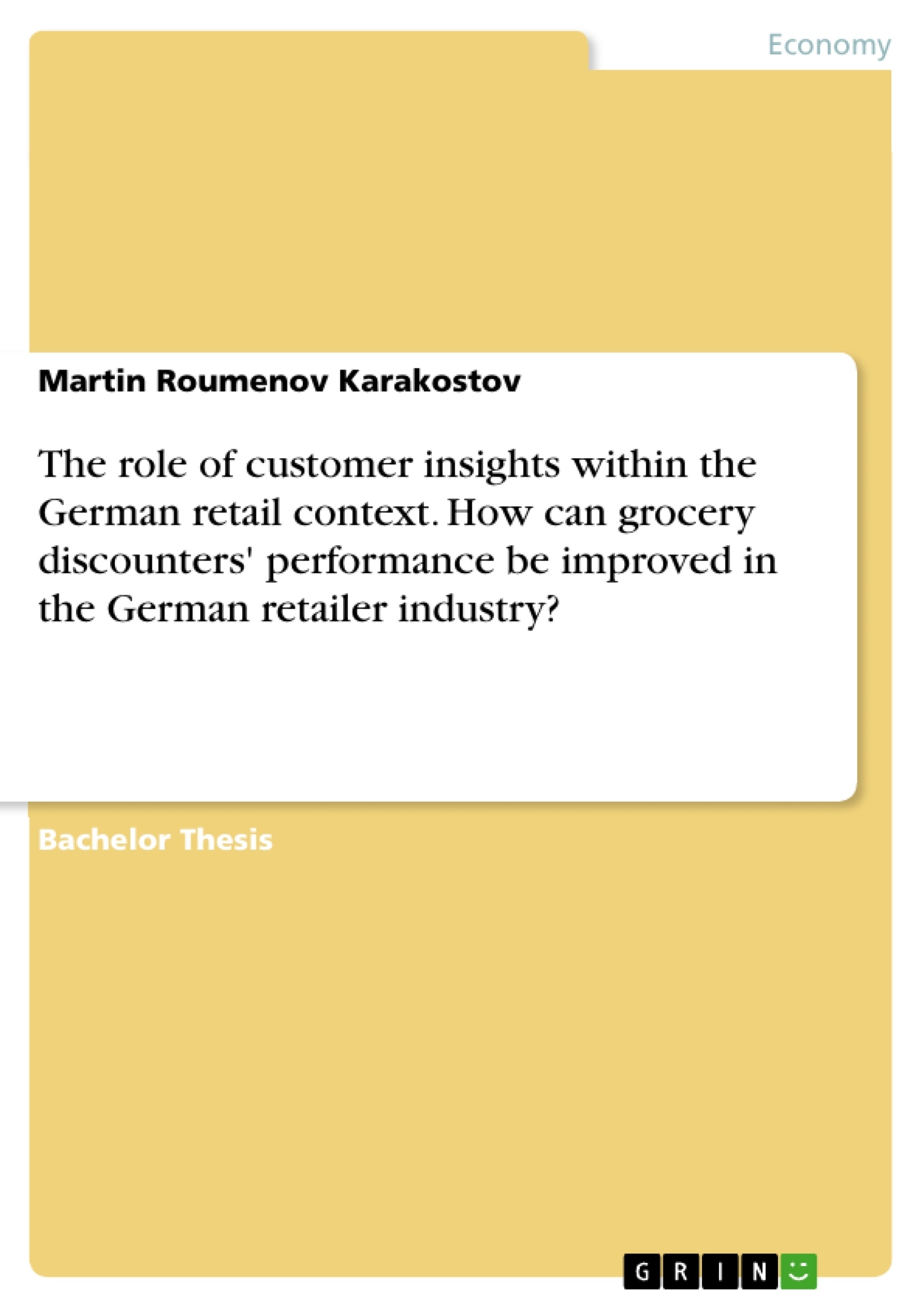The grocery retail sector is in overall terms a highly competitive sector throughout the world and the complexity of numerous agents driving shoppers toward an election or another has been extensively researched.
As a result of such fierce competition, discounters arose to provide value conscious shoppers with good quality products at a lower price. However, private label penetration depends on an array of factors depending largely on the country, the retailer and the product category.
This study provides the reader with a detailed literature review on how do customers insights affect purchasing patterns and furthermore examines the tools available to carry out suitable strategies within the German context from a discounter’s viewpoint focusing especially on private labels since it is considered the foremost differentiation strength although a review on the four P’s of Marketing-Mix besides determinants as product categorisation, breadth and depth of assortment, brand name and store atmosphere are analysed thoroughly.
Subsequently to the revision of the specific literature, a PESTEL analysis, a price positioning-matrix and a SWOT analysis have been carried out for the purpose of better comprehending the German retail context.
Lastly, an empirical research has been conducted to confirm the findings through abductive reasoning since the sample survey is limited to one hundred and twenty respondents.
The research concludes that the main drivers to attract shoppers to the store were distance, price, quality and breadth of assortment. Moreover, in-store other variables may entice the shopper to increase its per capita expenditure as a lower music tempo, or less crowded atmosphere as the shopper notices more promotions although given the extensive amount of variables playing a role the abstract section provides only a partial understanding of how branding and store image should be managed.
Inhaltsverzeichnis (Table of Contents)
- Abstract
- Key Concepts
- Introduction
- Retail Marketing
- Private Label as a Retail Marketing instrument
- Defining Private Label
- History of private label in retailing
- Advantages of private labels
- General problem and goal
- Motivation
- Approach
- Limitation
- Contribution
- Literature review
- Types of private labels
- Market share of private labels among countries and several sectors
- Supermarkets' price positioning matrix in Germany and market share
- Private label shopper segment
- Decision-making process / Shopper insights
- Price
- Product
- Placement
- Promotion
- Store atmosphere
- Category management
- External analysis (PESTLE) of the German context
- Analysing the macro-environment
- Demographic/ Sociocultural analysis
- Economic analysis
- Environmental & Ethics analysis
- Technological analysis
- Political and Legal analysis
- SWOT analysis of the industry
- Primary data analysis / Survey
- Survey Methodology
- Research hypothesis
- Confirmation of secondary data
- Umfrage/Survey
- Survey analysis
- Conclusions & questions for further research
- Conclusion
- Further topics for research
- Bibliography
Zielsetzung und Themenschwerpunkte (Objectives and Key Themes)
This dissertation aims to investigate the role of customer insights in the German retail context, specifically focusing on how discounters can improve their performance within the industry. It explores the impact of customer insights on purchasing patterns and examines strategies for leveraging these insights to enhance discounter performance.
- The influence of customer insights on purchasing decisions within the German retail sector.
- Strategies for discounters to improve their performance through effective use of customer insights.
- The role of private labels as a key differentiation strategy for discounters in the German market.
- The impact of the four Ps of marketing mix (price, promotion, product, and placement) on customer behavior.
- Analysis of the German retail environment through PESTEL and SWOT frameworks.
Zusammenfassung der Kapitel (Chapter Summaries)
The dissertation begins with an introduction to the topic of customer insights and its relevance to the German retail sector. It then delves into the concept of private labels as a vital marketing tool for discounters, exploring their historical development, advantages, and current market trends.
The study further examines the decision-making process of private label shoppers, analyzing factors such as price, product attributes, placement, promotion, and store atmosphere. It also analyzes the German retail context through a PESTEL framework, providing insights into the macro-environment influencing the industry.
The dissertation concludes with an empirical research section, analyzing survey data to confirm the findings regarding customer preferences and purchasing behaviors. The study explores the impact of various factors on shopper decisions and provides insights into how discounters can optimize their strategies to attract and retain customers.
Schlüsselwörter (Keywords)
The key concepts explored in this dissertation include private labels, shopper insights, category management, marketing mix (price, promotion, product, and placement), branding, store image, PESTEL analysis, SWOT analysis, and price-positioning matrix.
Frequently Asked Questions
How can grocery discounters improve their performance in Germany?
Performance can be improved by leveraging customer insights, optimizing private labels, and managing store atmosphere factors like music and crowding.
What are the main drivers attracting shoppers to German stores?
According to the research, the primary drivers are distance, price, quality, and the breadth of the assortment.
What role do private labels play for discounters?
Private labels are a foremost differentiation strength, allowing discounters to provide quality products at lower prices compared to national brands.
How does store atmosphere affect spending?
Variables such as a lower music tempo or a less crowded atmosphere can entice shoppers to notice more promotions and increase expenditure.
What is a PESTEL analysis in the retail context?
It analyzes the macro-environment of the German retail sector, covering Political, Economic, Sociocultural, Technological, Environmental, and Legal factors.
Why is the German grocery sector considered highly competitive?
The sector is characterized by fierce competition among numerous agents and a high penetration of discounters focusing on value-conscious shoppers.
- Arbeit zitieren
- Martin Roumenov Karakostov (Autor:in), 2015, The role of customer insights within the German retail context. How can grocery discounters' performance be improved in the German retailer industry?, München, GRIN Verlag, https://www.grin.com/document/340659



